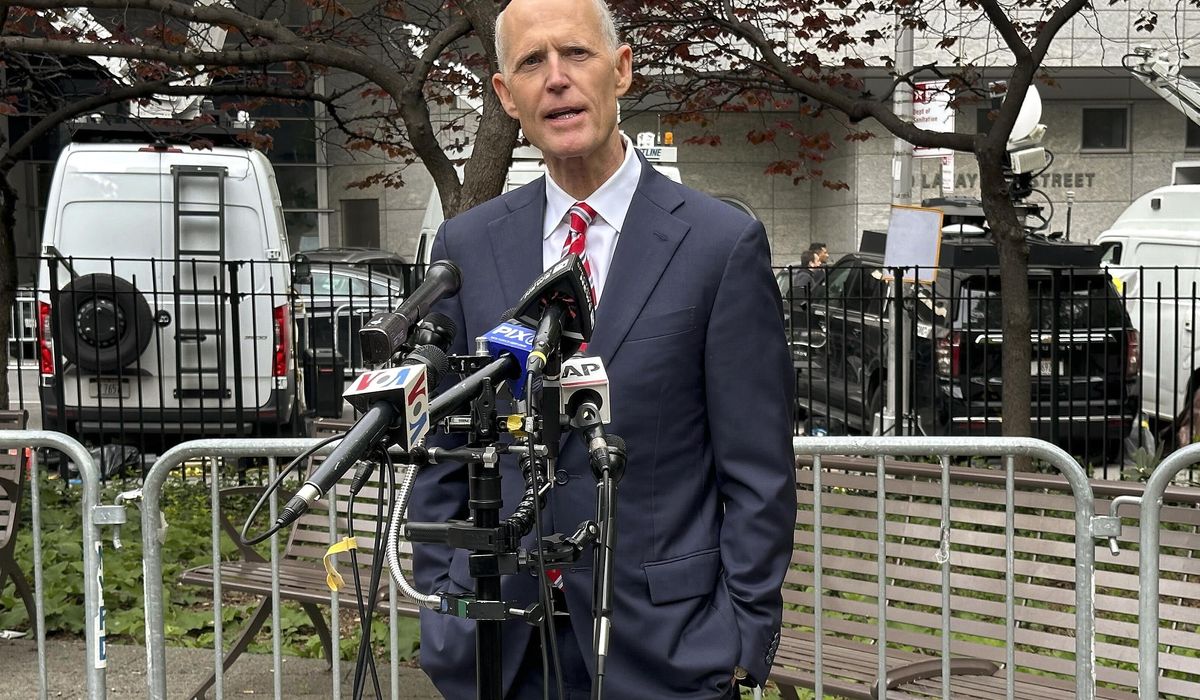


Sen. Rick Scott of Florida announced Wednesday that he is running to replace Mitch McConnell as Senate Republican leader next Congress, positioning himself as the anti-establishment candidate in what is now a three-way race.
“I believe now is a moment we need dramatic change,” Mr. Scott said in a letter sent to GOP colleagues announcing his bid. “I believe that our voters want us to use this leadership election to make a choice to upend the status quo in Washington.”
Mr. McConnell of Kentucky, 82, the longest-tenured Senate GOP leader, announced earlier this year that he would voluntarily exit his leadership post after the current Congress ends but remain in the Senate as a rank-and-file member through at least 2026 when his current six-year term ends.
Sens. John Thune of South Dakota and John Cornyn of Texas quickly announced their bids for GOP leader after Mr. McConnell decided to step aside and create the first opening atop the Senate Republican Conference since Mr. McConnell assumed the post in 2007.
Mr. Thune currently serves as Senate Republican whip, the No. 2 spot in leadership, and Mr. Cornyn held that post before him but was term-limited out. Both are considered allies of Mr. McConnell within the conference, whereas Mr. Scott is part of a gang of right-wing senators who sometimes serve as antagonists to GOP leaders.
Mr. Scott ran against Mr. McConnell in the most recent intra-party election for GOP leader but lost, earning only 10 votes from the 49-member conference. It’s unclear whether he would garner more support in an open contest rather than an attempt to topple the longtime leader. His letter made clear that his bid is about changing the way Republican leadership has traditionally operated.
“I think we need to be way more transparent with each other and the American people,” Mr. Scott said. “There have been far too many backroom deals cut in secret, rarely do things go through the committee process, and it’s accepted practice to not allow amendment votes to trillion-dollar spending bills. We are routinely surprised with legislation and asked to vote on it without having had any input or even time to review it.”
Mr. Scott also complained that Senate Republicans rarely work in concert with their House counterparts, instead allowing many bills that are supported primarily and often unanimously by Democrats to advance with minimal GOP support.
“Republicans all across America want the Republicans they elected to the U.S. Senate to stop caving into Democrat demands,” he said. “This is not an unreasonable request or expectation.”
While Mr. Scott’s message will resonate with some of his right-wing allies, it may fall flat with the more centrist members of the conference who are willing to partner with Democrats to pass legislation into law. However, the number of senators in both parties willing to regularly work across the aisle has shrunk in recent years, and partisanship in which both parties try to appeal to their bases has become more commonplace.
One unknown factor that could make a difference in the GOP leader race is if former President Donald Trump decides to weigh in for or against a particular candidate.
Mr. Thune and Mr. Cornyn, like Mr. McConnell, had at times broke from Mr. Trump after his 2020 loss and the Jan. 6 riot at the Capitol. But Mr. Scott has been a bit more cozy with the former president, even traveling up to New York recently to attend Mr. Trump’s ongoing trial and defending him against allegations that he falsified business records to cover up hush money payments to porn star Stormy Daniels.
Mr. Scott evoked Mr. Trump in his letter, noting GOP voters “think the persecution of President Trump is criminal,” that the Justice Department and FBI have been weaponized against him and conservatives and want Republican lawmakers “to fight back harder against the destruction Biden and the Democrats are bringing to this country.”
And in a more direct appeal, Mr. Scott noted he has known Mr. Trump since before either of them decided to leave their business careers to pursue political office.
“As Republican leader, I will protect senators’ interests while helping President Trump accomplish his goals,” he said. “Our country’s success and our Conference’s success will be dependent on President Trump’s success.”
Touting his background buying and overhauling healthcare, manufacturing and technology companies, Mr. Scott said he would bring his business acumen to the role of GOP leader. Keys to his business success that he wants to replicate include “creating a plan for success, working much harder than our competitors, being willing to make tough choices, and measuring our results and holding ourselves accountable for mistakes and failure.”
Mr. Scott laid out several promises to his colleagues in the letter, including that he would help them get reelected regardless of whether they support him and never pressure senators to vote in a way that is counter to their campaign promises or state’s interests.
He also said he would support a six-year term limit for the GOP leader role, as is the case with most other elected and committee leadership positions in the conference.
• Lindsey McPherson can be reached at lmcpherson@washingtontimes.com.
